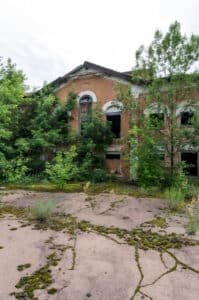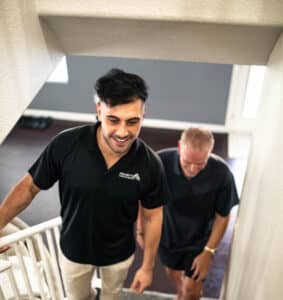Adverse Possession Laws Georgia
Let’s chat about squatter’s rights in Georgia. It might sound surprising, but squatters can actually make a play for ownership of a vacant property if they meet certain criteria. So, if you’re a landlord in Georgia, it’s smart to be informed about this to steer clear of any potential long and expensive disputes.
In Georgia, squatters can lay claim to property through adverse possession after a whopping twenty years of continuous occupation and keeping up with property tax payments.
While squatting isn’t always synonymous with breaking and entering, this info might not be the greatest news for property owners with empty places.
Is a Squatter and a Trespasser the Same?

Let’s clear up the confusion between squatters and trespassers in the realm of real estate law and Georgia’s adverse possession laws.
You might think a squatter and a trespasser are pretty much the same, but they’re not. When folks hear about squatters, they often assume they’re just trespassing or trying to claim ownership of a property. However, it’s a bit more complex than that. If the property owner decides to boot them out with the help of the authorities, they’re no longer just trespassing. Their squatting has shifted from a civil matter to a criminal offense.
Tenants at sufferance, on the other hand, are often called holdover tenants. These folks decide to keep living in the rental place even after their lease agreement expires. The twist here is, unless the landlord takes legal action and files for unlawful detainer, these holdover tenants can stick around, and it’s totally up to the landlord’s discretion. But remember, the landlord can also give them the boot at any time without any prior notice.
What counts as Adverse Possession in Georgia?
Adverse possession is the legal process that lets a squatter claim ownership of a property they’ve occupied, but they need to meet certain legal requirements. Now, someone doing this is called a disseisor. This fancy term means they’re asserting that they’ve ousted the real owner and now legally own the property.
To make it work, a disseisor must prove some basic elements:
- Exclusive Use: They’ve got to act like they own it, keeping others out, including trespassers and the real owner. Their use of the property must be exclusive.
- Actual Possession: They’ve got to use and maintain the property like an owner. Think mowing the lawn, doing landscaping, or making improvements.
- Open and Notorious: No hiding here. They must use the property openly, in a way that’s visible to the public or the owner. No sneaking around.
- Hostile: This one’s not about fighting; it means they’re using the property without the owner’s permission. They’re essentially challenging the owner’s claim.
- Continuous Use: Finally, it’s not a one-time thing. They’ve got to keep this up for the entire period set by the state’s squatter laws, which can vary.
So, that’s how squatters can claim property through adverse possession in Georgia.
What does Color of Title mean?
Let’s talk about “Color of Title” in property law. This term refers to a situation where someone claims to have a document that grants them property ownership, even though that document isn’t actually valid or has issues. For instance, imagine a deed with mistakes or one that’s void, making it seem like someone owns a property when, in reality, they don’t.
Color of Title often comes up in cases related to adverse possession and property claims. Squatters might use Color of Title to make it look like they own a property, potentially helping them gain legal ownership of it.
In Georgia, you don’t necessarily need Color of Title to file an adverse possession claim. However, if you do have Color of Title in Georgia, the required time of continuous possession to make a claim reduces to 7 years instead of the standard 20 years.
How to evict squatters in Georgia?

While most squatter evictions involve legal proceedings in Georgia, there are some steps a landlord or property manager can take to address the situation:
- Call the Sheriff: Getting in touch with the sheriff’s office is a crucial initial step. While they may not immediately remove the squatter if they have established some rights, it helps create an official record of the situation, which can be valuable if the case proceeds to court.
- Serve a Notice to Vacate: During the eviction process, you must provide notice to the occupant before pursuing legal removal through the sheriff’s office. If the squatter lacks a legitimate claim to the property through adverse possession or color of title, you can serve them with an Eviction Notice. In Georgia, the notice period isn’t specified by law, so it’s up to the landlord to decide how many days they will allow before eviction, typically ranging from 24 hours to 60 days.
- Start Eviction Proceedings: Evicting a squatter involves following due process and proceeding carefully. If the squatter claims adverse possession and refuses to vacate after the notice period, the next step is initiating eviction proceedings in the county’s court. This leads to a formal hearing where a judge reviews the case details and makes a ruling.
Consulting an attorney well-versed in Georgia’s property law is advisable to navigate the process smoothly and minimize potential legal complications.
Frequently Asked Questions
How long can Squatters stay?
Once a property owner has served notice to squatters requiring them to vacate the premises, the squatters are expected to move out by the end of the notice period. If the squatters have not complied and still remain on the property, the next step is to escalate the matter to court.
Is Squatting at a home illegal?
If squatters fail to meet the criteria for an adverse possession claim, they may face arrest on trespassing charges. Additionally, if the property owner has clearly communicated that the squatters are not allowed on the property and they persist in trespassing, they can potentially face criminal charges.
Do Squatters have to pay property taxes?
In order to establish legal ownership of a property in Georgia, squatters are required to cover property taxes.





